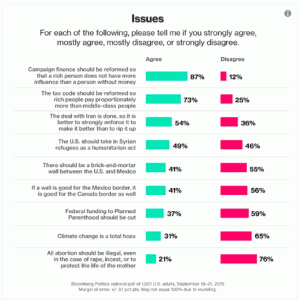Problems with Polling
It is extremely important to constantly measure public opinion in order to maintain popular sovereignty. Elections can help show what people are looking for in government. But polls and surveys can be helpful to get insights into less obvious public opinions. Social scientists develop tools to help politicians and government officials identify what the public wants. This is more beneficial than the long letters or rants that few citizens send in as they show a biased view of what the masses want.
Randomized surveys, also known as “scientific surveys” are particularly helpful when measuring public opinion. Though the survey may only question 1000 to 1500 Americans, the randomness helps to get a representative sample of what the U.S population as a whole is thinking/feeling in regards to political culture. Getting a sample of 1000 to 1500 Americans which is representative of the population is a very difficult task. The different age cohorts, sub-cultures, religions and various other differentiators each need to be accounted for in proportion to the entire population.
The potential ways to conduct these political polls include; face-to-face interviews, telephone surveys, and through the internet. However, often, the pollsters get it wrong. We witness this time and time again through political elections. Why is it that these pollsters get it wrong? The book attributes it to the wording of the questions, the answer options to the questions, the intensity of people’s preferences, and even timing. It seems that the reasons for the inaccuracy are widely stated but not with great depth.
In class, we discussed the issues associated with questions being worded poorly. A pollster may ask a question to discover if people believe that President Barack Obama is muslim. Surprisingly 66% of all Trump supporters ignorantly responded that the believed he is muslim. Our discussion in class lead to the issue that although people stated they think President Obama is muslim they may really be trying to convey something else. Professor McGowen explained that what the individual could have really been trying to say could be a myriad of things including; President Obama does not hold christian ideals or President Obama does not align with my beliefs. Although this is not a great question to begin with, I would like to know why the polls do not just ask the sub-question that the original question is trying to get at. It frightens me that such large assumptions are made based on the answer to the original question. This is just one example of a poorly worded polling question. Let’s take a look at a few other issues question wording can have:
Each of these questions is heavily slanted to gain specific goal-oriented insights. The problem with this type of polling is that you will gain information that is skewed and inaccurate in depiction of the public’s general beliefs. This can lead to more (or less) confidence for certain political parties or campaigns that is not truly representative of the population. I find it very frustrating that so much of what makes up politics is this distasteful hidden motive coming from certain parties.
A potential solution to these biased polling and slanted questions could be something like a “poll-rating” this would show how authentic a poll is in comparison to others. Similar to a yelp review or rotten tomatoes, it would alert people as to how realistic the findings of the polls are. This would deter pollsters from creating biased polls as they would receive negative ratings that would warn people from trusting the findings. As far as who would be responsible to conduct the ratings, some sort of equally representative committee would preside over the ratings and decide.
Sources:
www.redstate.com/moe_lane/2015/09/24/bloomberg-bad-polling
